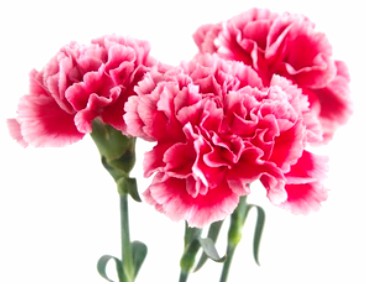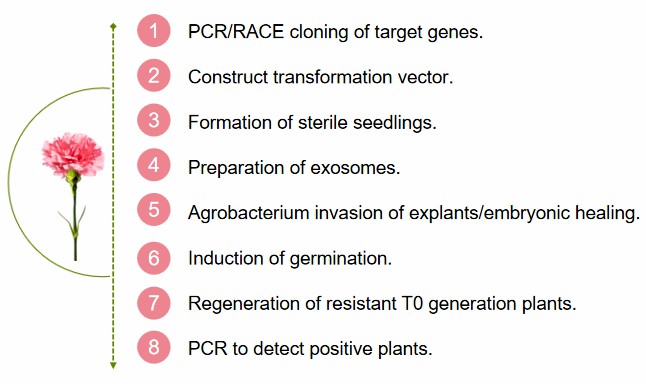Dianthus caryophyllus (Carnation) Transformation
Dianthus caryophyllus, also known as carnation, is a perennial herb with abundant flowers of various shapes and colors, fragrant and long blooming time, which is very suitable for bouquets and gardens, and has been planted in many countries around the world. It is one of the most used flowers in the world. Genetic transformation of carnation has provided valuable data and a solid theoretical foundation for the regulation and genetic improvement of important ornamental traits of carnation through the identification of key genes regulating flower color, flower shape, and flower fragrance, which is of landmark significance for the promotion of molecular breeding of carnation.
Lifeasible takes plant genetic transformation system as its characteristic advantage, and we also specialize in various molecular biology experimental techniques. we have leading technical advantages in carnation genetic transformation and genetic engineering-related techniques, with a high positive regeneration plant rate. The carnation genetic transformation methods we provide are important in helping researchers promote carnation research and application.

What do we offer?
- Selection and preparation of Agrobacterium. First, select Agrobacterium that carries a Ti plasmid (Tumor-inducing plasmid). This plasmid is a key factor used by Agrobacterium to deliver exogenous DNA into plant cells.
- Plasmid preparation. Plasmids usually contain the target gene, selection marker genes (e.g., antibiotic resistance genes used to screen plants for successful transformation), and other regulatory elements. We will prepare pure plasmid DNA by aseptic technique.
- Agrobacterium infection. The target plasmids are introduced into Agrobacterium and then cultured so that Agrobacterium cells take up these plasmids. The plasmids contain DNA fragments adapted to Agrobacterium infection, enabling the Agrobacterium cells to deliver the target genes to the plant cells during the infection process.
- Plant processing. Carnation tissues usually need to undergo special treatments, such as cutting and removing the epidermis, to increase the efficiency of Agrobacterium infection. This can be accomplished by adjusting the composition of the culture medium and hormones.
- Co-culture of Agrobacterium with carnation cells. Agrobacterium and treated carnation tissues were cultured together. In this process, Agrobacterium infects the carnation cells and passes on DNA fragments containing the target gene to the plant cells.
- Screening and cultivation of transgenic plants. Carnation cells into which the exogenous gene has been introduced need to be screened in culture medium, usually through the addition of antibiotics or other selection markers, to select cells that have been successfully transformed. Next, these cells are cultured into complete plants.
- Validation and analysis. Finally, the plants we will obtain need to be validated and analyzed to confirm that the target gene was successfully transferred. This usually includes molecular biology methods, PCR assays, and gene expression analysis.
What do customers need to provide?
- Customers can directly provide the constructed flower transformation vectors, or let our company help you to clone the genes and express, silence, knockdown and other vector construction.
- By default, we adopt the flower varieties recommended by our company. If customers request to develop the transformation varieties, they need to negotiate separately.
- Due to various factors, the cost of the experiment may be adjusted from time to time, the specific cost of the experiment, please refer to the response of the direct consultation and contact.
Our project reports
- Vector construction sequencing report and pictures.
- Pictures of exosome infestation, induced healing, embryonic healing, tissue differentiation, and plant regeneration.
- Gel electrophoresis diagram for PCR detection of target genes in T0 generation regenerated plants.
Why choose us?
- High success rate. We have a professional technical team engaged in plant genetic transformation for many years, which can significantly guarantee the success rate of the experiment.
- Experienced. We have many years of experience in plant genetic transformation, and the genetic transformation technology services we provide cover dozens of plant species.
- Efficient experimental process. Our experimental technology platform allows us to carry out genetic transformation projects at any time, and we use various transformation methods, including Agrobacterium, which can quickly and efficiently carry out genetic transformation of carnation.
Our service workflow

Lifeasible is an industry leader in the field of plant genetic transformation. Based on our advanced technology platform and experienced research team, we can conduct flower carnation transformation service experiments throughout the year. Customers can make personalized requests for project service options and delivery standards, and we will provide customized solutions according to their project requirements to ensure that their experimental needs are met to the greatest extent possible. If you are interested in us, please feel free to contact us.
For research or industrial raw materials, not for personal medical use!

